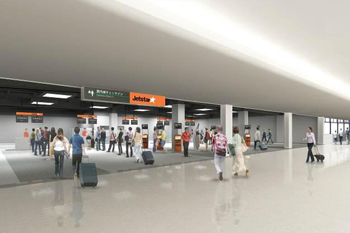Narita evolves into
new world gateway
Narita International Airport has been aggressively adapting to changes sweeping across the air travel industry, including the rapid emergence of low-cost carriers and proliferation of open skies agreements
Under an agreement with local governments, Narita airport is seeking to boost its capacity to 300,000 takeoff and landing slots per year in a move that promises to spur the opening of additional low-cost carrier services and increase the number of visitors to Japan. Here is a look at the evolution and growth envisioned by the airport, which has rebranded itself as "World Sky Gate_Narita."
Active support of LCCs

Hideharu Miyamoto, Vice President
Corporate Strategies and Planning
Narita International Airport Corp. (NAA)
This summer marked the launch of two domestic low-cost carriers (LCCs) based at Narita International Airport, Jetstar Japan and AirAsia Japan. Partly owned by Japan Airlines, Jetstar Japan started operating on July 3, followed on Aug. 1 by AirAsia Japan, a subsidiary of All Nippon Airways. Both LCCs plan to leverage their foothold at Narita to add more domestic flights and international service to their portfolios.
"LCCs based in Europe and Southeast Asia are now rapidly setting up shop in East Asia as well," said Hideharu Miyamoto, vice president for corporate strategies and planning at Narita International Airport Corp. (NAA). "The big thing about these budget airlines is that they are seeking to create new demand, rather than battle against one another to capture existing demand. To attract more LCCs to Narita, we are actively taking steps to enhance the airport's appeal, such as by making facility enhancements."
The LCC business model revolves around the reduction of operating costs through various means, such as by focusing on frequent short-haul flights, levying extra charges for in-flight services and baggage handling, and boarding from the tarmac instead of through the jetway. Naturally, airports that do not support this approach are not likely to be chosen as hubs or destinations for discount carriers.
As part of its drive to bring more LCCs to Narita, NAA opened a domestic service facility for budget airlines on the south side of Terminal 2 this past Sept. 12, and later this month will begin operating another facility for domestic LCC flights on the north side of the same terminal. Both are temporary facilities that will be replaced by a combined domestic and international terminal for LCCs that is scheduled to be completed in fiscal 2014. Design and preliminary construction work for the new terminal is set to go into full swing during the current fiscal year.
In order to pack frequent short-haul hops into each day, LCC timetables include a good number of early morning and late night flights. Since passengers on those flights need easy access to public transportation outside regular hours, NAA has supported the inauguration of low-cost bus services between Tokyo and Narita that offer extended service hours both morning and night for ¥1,000 each way.

A computer image of the counters to a low-cost carrier at Narita airport.
|


